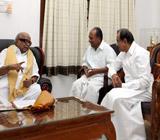
Chennai/New Delhi, Mar 19: DMK today withdrew its support to the UPA and pulled out its five central ministers over the issue of alleged human rights violations of Tamils in Sri Lanka but the Congress-led government said there was no threat to its stability.
DMK supremo M Karunanidhi while announcing the party's decision ending its nine-year long association with the UPA, however, kept a window open of returning to the alliance, saying it was ready to reconsider it if Parliament adopts a resolution before March 21 incorporating the two amendments he had suggested to be moved on the US-backed resolution at the UN Human Rights Commission(UNHRC).
Finance Minister P Chidambaram, who was part of the team of three central ministers which met Karunanidhi to try to placate him on his demands yesterday, asserted there is no crisis and that Government enjoyed majority and it was "absolutely stable".
DMK has 18 MPs in the Lok Sabha and the strength of the ruling alliance has reduced to 224 after its pull out but UPA enjoyed the support of 281 MPs that included those of outside supporting parties. Samajwadi Party(22) and BSP(21) were among the outside supporters(57) in the House where the magic number for a majority is 272.
After chairing an emergency meeting of TESO, a pro-Tamil organisation revived by him last year, a combative Karunanidhi charged the Mamnohan Singh government with not only allowing 'watering down' of the US resolution against Sri Lanka at the UNHRC but also not even considering any of DMK's suggested amendments to that resolution.
"When a situation has been created that will not benefit Ealam Tamils, it will be a big harm to the Tamil race for DMK to continue in government. (therefore) it has been decided that DMK will withdraw from the cabinet and the coalition," he said in Chennai in a statement read out by him.
Government is holding consultations on DMK demand for Parliament resolution, Chidambaram said.
"Let me assure you that the stability of the government and the continuance of the government are not an issue. The government is absolutely stable and enjoys a majority in the Lok Sabha," Chidambaram told reporters in Delhi.
Chidamabaram also took note of the remark by the former Tamil Nadu Chief Minister that the DMK will review its decision.
Asked whether he would reconsider his decision of quitting the alliance if his demand for a resolution in Parliament was conceded by the Centre, Karunanidhi said "we are ready to change our opinion." DMK has one cabinet minister and four junior ministers.
"We have time today till this evening, so also tomorrow and even ahead of March 21. Before that if the resolution is introduced in Parliament as desired by us and taken up for discussion, we are ready to change our opinion (of withdrawal of support)," Karunanidhi said. A US-sponsored resolution on alleged human rights violations in Sri Lanka is due to come up at UNHRC in Geneva on March 21.
Asked whether his party would extend outside support to the Centre, he emphatically said "ethuvum kidayathu" (nothing).
One of the amendments was to "declare that genocide and war crimes had been committed and inflicted on the Eelam Tamils by the Sri Lankan army and the administrators."
The second one was "establishment of a credible and independent international commission of investigation in a time bound manner into the allegations of war crimes, crimes against humanity, violations of international human rights law, violations of international humanitarian law and crime of genocide against the Tamils."





Comments
Add new comment